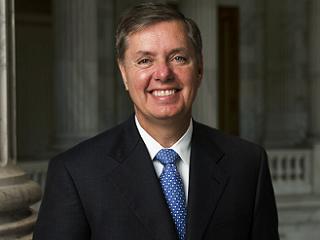
As you’re likely well aware, health care reform passed late last night, after more than a year of brutal debate; maybe now we can move along to other important issues, like this climate and energy bill I’ve been harping on. But with the passage of health care along strict partisan lines, are politics in Washington so contentious that we might not accomplish anything else this year?
That seems to be the posturing from Lindsey Graham (R-SC), the lone Republican working with Democrats to craft energy and climate policy. Shortly after last night’s vote, his office fired off a statement calling the use of reconciliation to pass health care “sleazy.” Last week he made similar remarks, warning that passing health care reform along partisan lines would “poison the well” for bipartisan work on other issues. Here’s his statement:
The Democrats may have won today in the House of Representatives, but the American people lost. Higher taxes, more government control of health care, and Enron-style accounting define this bill. The upcoming elections will be a referendum on the substance and process used to pass it. I believe it will be a clear choice. Republicans will pick up a lot of votes from people who think this is bad for their business, their family, and the process used to pass it was sleazy.
I am committed to repealing this multi-trillion dollar health care nightmare and replacing it with bipartisan reform that will lower costs and improve access.
Of course, as a Republican he’s basically required to say as much. And the idea that there was any comity left in Congress, as Kevin Drum has noted, is pure comedy. But some like Josh Nelson over on EnivroKnow have begun to wonder if Graham might be looking for an out on his work on climate and energy policy. I sure hope not; I think he’s been very sincere about his desire to address these concerns, even in the face of a good deal of criticism from other members of his party. Of course he’s advocating for including a lot of things in a bill that aren’t necessarily good for the environment, but he’s been at least willing to come to the table. I would note, however, that he hasn’t explicitly committed to voting for a climate and energy package this year, only to working on building bipartisan support for a bill. From what I’ve heard from Senate staffers, it’s not clear that he has so far convinced other Republicans to join him in that effort.
Graham is also one of the few Republicans who has been willing to cross party lines on issues like climate and energy policy, immigration reform and Guantanamo, so he holds a lot of sway. This is particularly true on climate and energy, where five to six moderate Democrats are basically written off as a “no” vote on anything that includes a cap on carbon. Not only is his support crucial, but he’s seen as the key to bringing along enough other Republicans on this issue to pass a bill.
We’ll have to wait and see where Graham shakes out. He, along with John Kerry (D-Mass.) and Joe Lieberman (I-Conn.), is expected to formally roll out details of their legislation soon, possibly as early as this week. Some details have already leaked, though many specifics remain in flux, according to sources who have met with the senators.













